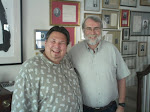First published 1-22-2009 at
Sequenza21:
I heard the world premiere of Absolute Ocean by Augusta Read Thomas in Houston Thursday night at Jones Hall.
1. Thomas spoke before the concert about her compositional process and specifically about Absolute Ocean. Her talk was engaging, direct and charming; Thomas included showing the audience some of the manuscript score, and explained how 15 seconds of music might take five hours to score by hand!

2. Absolute Ocean is a work for Soprano, Harp and Orchestra in three movements from poetry by ee cummings commissioned by the Houston Symphony. The soloists, soprano Twyla Robinson and harpist Paula Page, performed with conviction and panache - putting the music first without extraneous movement or distractions. The texts were projected (not always coordinated, but hey, they were there!) on each side of the stage and added to the performance.
3. The opening “Graceful” movement was pointilistic and bright. Robinson pulled pitches from nowhere and was matched beautifully by Thomas’ instrumental colors and combinations. Page was often backed by four percussionists and divisi solo strings.
4. Perhaps the most charming of all was the second movement, “Playful, spry and jazzy.” Hans Graf was direct and precise with the orchestra, making it easy for the musicians to move in and out of the lines deftly. Again Robinson caught the feeling perfectly of cummings text and Thomas’ frolicsome and vivacious score. Page was purely color for the most part, but had a chance to shine with a cadenza between this movement and the finale. Evidently this cadenza was added later at Page’s request - which certainly went more to weigh the harp part…I would not call Absolute Ocean a double concerto, but rather an orchestral work for soprano with a prominent harp part. I had heard it referred to as a concerto - and would be disappointed as such - luckily it is such a wonderful work, the nomenclature is not important.
5. “Resonant and elegant” finished the 18 minute work and the short first half (the second half was Mahler’s Fourth Symphony) of the concert. The finale paints the words with creative combinations, and has a satisfying and direct ending. Absolute Ocean is a complete success for the Houston Symphony, and kudos to Graf for adding such a gorgeous work to the symphonic world.
There are two more performances of Absolute Ocean, Saturday night at 8pm and Sunday afternoon at 2:30pm. There is another pre-concert talk Saturday at 7:10pm open to all ticket holders. The 2009-10 season has just been announced for the HSO, and includes another Houston Symphony Commission, for chorus and orchestra by Kevin Puts.
First published 1-24-2009 at
ClassicallyHip:
I heard the Houston Symphony again tonight in Jones Hall. (Read about the premiere performance Thursday night, here at Sequenza21.)

1. Augusta Read Thomas spoke before the concert (see a video clip here) - showing some of the hand written score. There were lots of questions from the audience and good background about the work and Thomas' approach to composition.
2. Absolute Ocean's first movement is poetic and pointilistic. I heard strains of Copland in the music tonight, a flavor I didn't notice Thursday. There was a complete gaff in the supertitles - which I ignored even when they returned in the second movement - choosing to focus completely on the performance and music. Soprano Twyla Robinson' diction is such that you don't need the supertitles - and her voice is pure, passionate and pleasing.
3. The second movement, complete genius, was quicker and flowed with all of its humor, charm and brilliance. Ensemble was tight with the soloists and orchestra.
4. After a brief cadenza, the finale movement is touching and appropriately dramatic. Word painting without being banal certainly highlights the poetry with sublime music.
5. Mahler's Fourth Symphony is an ideal pairing for Absolute Ocean, and in particular, Twyla Robinson - she's busy for the first 20 minutes of Thomas' piece, then has a break until the finale of Mahler...also the dreamy score of Thomas leads beautifully to the heavenly view of Mahler. A completely satisfying program.
There is another performance of Absolute Ocean and Mahler's Fourth Symphony tomorrow afternoon at 2:30pm.
Here is Augusta speaking Saturday night before the concert at Jones Hall, a wonderful thought about music and text:
 This weekend, Camerata San Antonio performs music by Andre Previn and John Harbison. On the program is "Songs America Likes to Sing"...
This weekend, Camerata San Antonio performs music by Andre Previn and John Harbison. On the program is "Songs America Likes to Sing"...


















